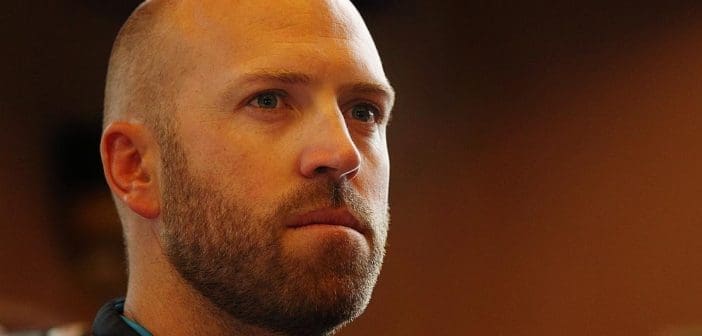Known as one of the greatest wicketkeeper-batsmen of all time, Matt Prior certainly went through adversity alongside such success.
And speaking at the Working Options Leadership Symposium last month, he detailed both his past, present and future with his new ventures in the world of cycling.
At first the production showed a trailer of ‘The Edge’ – a documentary detailing the mental strength and undulation suffered by the most successful English cricket team this century – a side who won three Ashes series back-to-back, including an anomalous victory in Australia.

credit – The Edge Documentary
“My palms were sweating just watching that – just feeling the emotion of it. It just takes me back to the dressing room culture, the challenges we set ourselves as individuals and as a team.
“It was an incredible era to be part of English cricket, and I was so fortunate to play in it. Alec Stewart, a man who played 133 times for England told me he’d have thrown 50 away just to win one Ashes series – and that particular team won three and in India becoming the best team in the world.
“We shared a huge amount of success which was incredible. But a large part of the story is not only our route to success, but the challenges we had to face during and after we achieved it.
“Its not just relatable to sport, it’s related to business, and success in any walk of life.”
What came through was the fact that achieving the goals wasn’t as difficult as actually maintaining them. And there’s a relatable point to that in more modern-day sport, with Tyson Fury.
After spending years training to become heavyweight champion of the world, and eventually beating Wladimir Klitschko, he was left alienated without any goals.
This led to years of depression and an eventual suicide attempt – obviously, now his return has shown that anyone can come back from the demons haunting the mind, but maintaining goals and keeping a handle on one’s success is key to performing consistently in any situation.
Sky’s Jeremy Thompson likened it to the Icarus tale, as ambition continued to overrule logic he eventually burnt his wings from getting too close to the sun. Some of Prior’s colleagues were burned more severely than others, with Jonathan Trott the most famously hurt by these mental pressures.
“As a group I don’t think anyone has fallen harder. We were literally on top of the world.
“But when we went away to Australia and got battered five-nil, we never really recovered from it. There was fall-out between individuals, the great Kevin Pietersen came out and told the world his version of events.
“But our whole ethos was about winning. In 2009 we went to the West Indies, got bowled out for 51 and lost the series and had an entire rethink.
“We sat down, and the leaders at the time Andrew Strauss and Andy Flower got us in a room and said ‘what do you want to do?’. And from that moment we set a very structured, precise goal.
“We want to be number one in the world.”
And it wouldn’t be long before they achieved that goal. 18 months was all it took for English cricket to be the pride of British sport and to become the most feared side on shores worldwide.
Prior attributed it to individuals becoming the best in the world and training harder than anyone else on the planet. The coaching staff were also a key cog, not just being ‘yes’ men and patting you on the back, but giving constructive criticism and striving for near-perfection.
The interesting part of England’s revival and upward mobility was the lack of change in personnel. Alastair Cook, Kevin Pietersen, Andrew Strauss, Stuart Broad, Prior himself, Jimmy Anderson, Ian Bell – all remained a constant throughout the successful period but featured for England beforehand.
“We knew we had the talent. We just didn’t really have the goals or momentum that we needed.
“Yes there wasn’t a shift in personnel, but there was certainly a cultural shift which changed our attitude towards cricket.
“Our expectations of each other increased, and our realisation of how much it meant to be a member of the England cricket team.
“We had simple rules to not only improve each other as cricketers but as people too. One example was the ‘never take a bridge’ rule. What that meant was, at Lords, the players could avoid the crowds of people waiting after a game too see you by just taking a bridge tow the car park and out.
“Our rule was, as a role model and however your day has gone, to never take the bridge. And it changed our attitudes. Make a good choice rather than a selfish choice.”
The business community can make inroads from Prior’s and England’s team culture at the time. Being happy for an individual even if they take your place, knowing that if you have your eyes and your culture set on a goal that you can achieve it.
“Probably one of my biggest findings after retirement was the similarities between professional sport and business – I get a very similar feeling when securing a negotiation than to taking a catch, for example.
“I’ve been running a professional cycling team for a few years now – and the transfer was seamless.
“We spent hours during my career with psychologists learning how to stay logical in high pressure situations, making good, clear and concise decisions in the moment. This can be transferred to the business world easily.
“To be able to execute what you envision is a key skill in any individual.”
The word Prior used, ‘individual’, cropped up a lot within his talk – which resonates as there is no overriding way of saying what’s best for people in general. Every person has an insurmountable number of variables to consider, and they can only analyse what works best for them.
“Get to know yourself better. What works for me? What gets me going? What frustrates me?
“One technique we had as a team was akin to this – when we went to Australia in 2010-11, It was probably the toughest tour to go on, and is now as you get abuse wherever you go. These Aussie fans want you dead.
“It’s highly emotive, stressful and a massive cognitive strain. Say if there was a decision that went against us, it was literally my role as wicket-keeper to notice if the group was losing the plot. If I did, I would shout ‘bubble’.
“That was the trigger to say we need to stay logical and make the right decision. It was our reset button.”
There are so many facets to being able to deliver a good performance – preparation, logic and execution being three of the main factors. And it would almost be similar in the business world, and Prior’s sports nutrition brand and cycling team, OnePro Group, has had the same treatment from step one as his England career did.
“The skills are transferrable. The five years of preparation for this in business feels like the time when I was 12 years old and I decided I wanted to play cricket for England.
“One day you get selected, one day you get dropped. One day you score 0, one day you score 100. It’s the same in another world – the rollercoaster of emotions you have are stark to those the public eye see.
“No one sees when you fail in the build up. You don’t just become an England cricketer. It’s trial and error for years until your trials are more and more successful.
“What makes the difference between the best and the rest? Ultimately it’s resilience.”
Matt now runs three parts of the OnePro Group: Cycling, Insurance and Nutrition – with the latter being a premium product for all athletes.
We’d highly recommend any supplement takers to check out Onepronutrition.com – and we wish Matt all the best of luck for the future.
![Prost International [PINT]](https://prostinternational.com/wp-content/uploads/2021/08/PINTtFontLogoRoboto1536x78.jpg)



